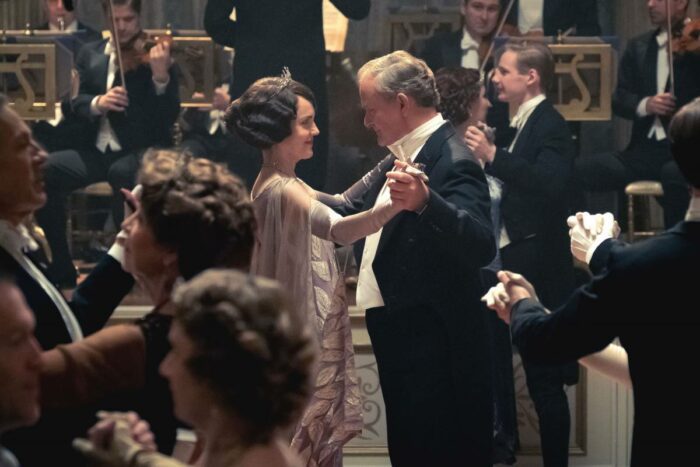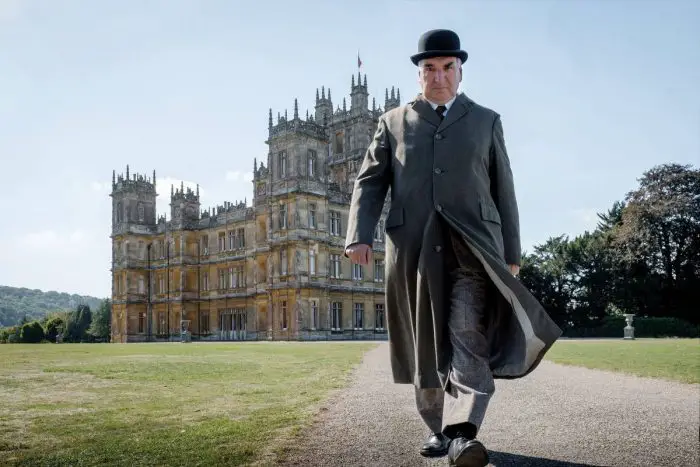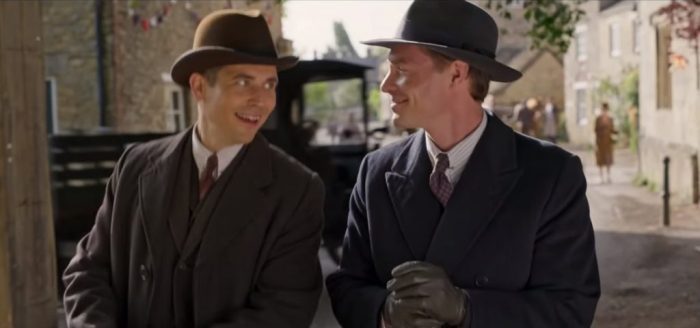Fear not, fellow non-Downton watchers! The film adaptation of the hit television show Downton Abbey, coming to theaters this weekend, is pretty accessible to the likes of us and, dare I say, a really smashing good time (apparently affecting the way I talk and write. Next thing you know, I’ll be saying I favour this film for its good humour and splendour while demanding my valet give me a cucumber sandwich).
While the television audience/fans will certainly benefit from knowing the ins and outs of all the specific characters (and I mean all of them: there are approximately 6,812 total characters in this movie), credit must be given to writer Julian Fellowes and director Michael Engler for providing a seamlessly constructed film that fills in the missing pieces for those who didn’t see the show without bogging the conversations between the main stars with “Last Week on Downton Abbey” exposition.
Unlike Sex and the City 2, where that show’s characters went to Abu Dhabi for…reasons, Downton Abbey promises no exotic excursions beyond the hallowed halls of the titular estate. Only a few forays into town, including a smoky speak-easy, would be considered a daring departure for a show known primarily for its period-specific pomp and circumstance within closed (but fancy) doors.
So, in a sense, likely for better, and not for worse, the Downton Abbey movie plays much like an episode of the show, just with a bigger budget. The costumes seem more detailed and exquisite, the cinematography is cranked to eleven, and the idea of a giant set piece is simply a big ol’ parade (complete with an assassination attempt!).

The year is 1927. The King and Queen of England are taking a tour of the country’s castles and manors and plan to make a one-night stop at Downton Abbey, the estate of Robert Crawley, the Earl of Grantham (Hugh Bonneville) and his American wife Cora (Academy Award nominee Elizabeth McGovern). When word comes to the folks above, like Lady Mary Talbot (Michelle Dockery), and to those below, like head housekeeper Elsie Carson (Phyllis Logan), the wonder and fear of hosting the royal family take over the household.
Naturally, being the Royal Family, the King and Queen have their own housekeepers, butlers, and valets who arrive early with ideas of how to run things. Before you know it, there is an all-out war between the working class of Downton and the stiff upper lip of the royalty help. But that isn’t the only problem coming into the royal visit: the furnace is down, the head butler Thomas Barrow (Rob James-Collier) has quit in protest as the Crawley’s have brought super-butler Charles Carson (Jim Carter) out of retirement, a mysterious military man is keeping his suspicious eye on Irish family member Tom Branson (Allen Leech), Lady Edith Hexham’s (Laura Carmichael) ball gown hasn’t arrived, Anna Bates (Joanne Froggatt) is trying to figure out who is stealing trinkets around the manor, and snarky Dowager Countess Violet Crawley (two time Academy Award winner and the real MVP, Maggie Smith) is stressed about meeting a cast-out cousin (Imelda Staunton) who she feels is holding Robert’s deserved inheritance from him.
Phew. And that is, only, like, forty percent of the full plot. Don’t worry, Mr. Bates, Lady Merton, Mrs. Patmore, Daisy, Molesley, Henry Talbot, Bertie Pelham, Andy Parker, and probably sixty others all make appearances as well. I can only imagine the amount of fan service provided though, and it should be said, all these specifically dedicated moments to the deep ensemble does not sacrifice the enjoyment of the overall product. The filmmakers even introduce three or four new characters on top of it all.

It truly is an achievement for all involved to make a film that (I assume) satisfies both fans of the show and newcomers to the franchise. Fellowes deserves specific credit for writing a screenplay that literally dangles 20 storylines from the start and resolves all of them to a satisfying conclusion. There truly isn’t one dull moment in the film despite the stakes being relatively minor. In the end, we are watching rich people do rich things whose biggest stress is whether the food comes out okay.
There is one exception to this, however. The character of Thomas Barrow, Downton’s closeted gay character who, I have been told, was portrayed early in the show as a mustache-twirling villain (don’t @ me, I don’t know!), is essentially given his own movie outside of the Royal hubbub. Since his character quits his job (temporarily) as butler due to the Carson deal, Barrow goes into town, initially to meet a friend working for the Royals, before joining a very forward gentleman named Webster (Perry Fitzpatrick), who takes Barrow to a secret speak-easy for gay men.
It is in these scenes that we see a darker side of the Downton Abbey universe. It is easy to show the rich Crawley family as wealthy goofs or oblivious elites and while that can mine for some social commentary, we never actually see the effect of such an entrenched elitist worldview on anyone outside of the serving staff who, in a sense, lead a pretty wealthy (and sheltered) life despite being considered servants.

By allowing Barrow to become a sympathetic victim of the very real prejudice of the period, the movie takes time out from the gallantry to show that the underclass, when not protected by years of inheritance and relative isolation from the “real” world, can become endangered simply for existing. Barrow already lives with a systemic shame for his sexual orientation so having to engage in clandestine enjoyment of his true self while also being publicly punished for it becomes a uniquely serious plotline in an otherwise lightweight film.
In the end, however, the movie dedicates most of its time to pleasing the eye and allowing the audience to escape to a bygone era, though even characters in the movie, like Lady Talbot, seem to realize that as the decade grows older, so do the rather archaic customs of ancient British society. Downton Abbey may live on but, as Mary is coming to realize, and as Barrow is experiencing, the real world is changing. But, not enough so that Barrow can be open about his sexuality or that Downton can stop employing a full house of servants…the change is incremental. Lady Mary’s epiphany is more of a sudden quirk in her characterization than a change in the movie/show’s worldview.
For now, as I assume there will be sequels, things will stay much the same. Downton Abbey will still give you the enjoyment of fancy dress parties and fun, but very low, stakes while maybe sprinkling in a few lines about how silly this hero-worship of the insanely rich is. Despite some of the events involving Barrow and Mary listed above, the film is never to be taken too seriously. You are cordially invited, after all, to simply enjoy yourself and escape. Downton Abbey provides that enjoyment in spades.
Downton Abbey will be released in the US on September 20th.



